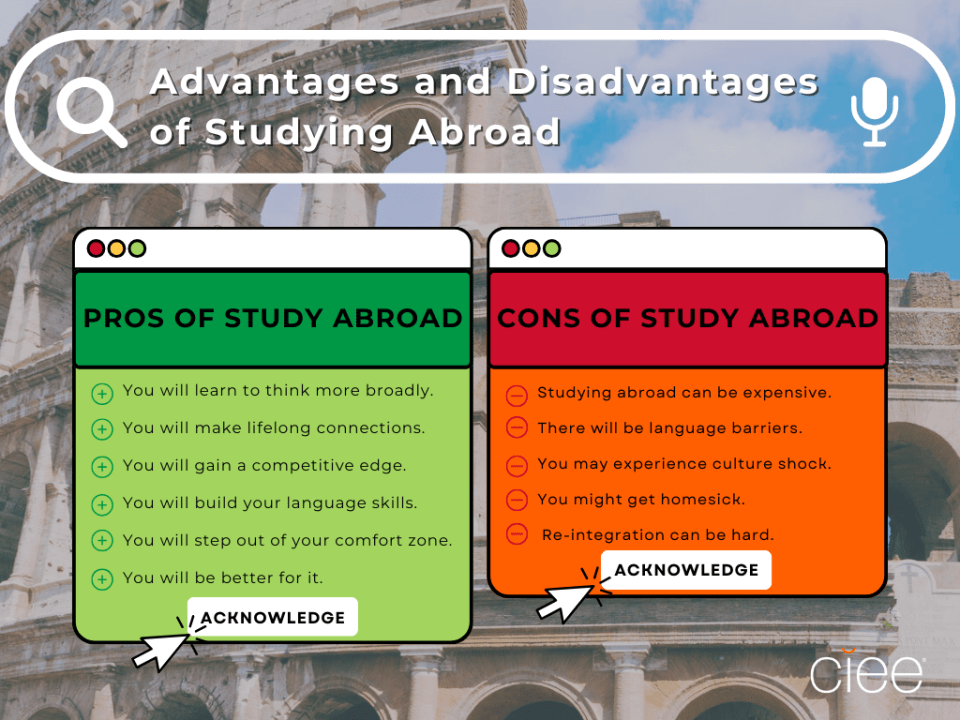What Are the Advantages and Disadvantages of Studying Abroad?
@cieestudyabroad These are the pros and cons of studying abroad! #cieestudyabroad #studyabroad #studyabroadadvice #studyabroadprograms #wheretostudyabroad #howtostudyabroad #college Sunshine - WIRA
Studying abroad is a big decision. On the one hand, studying abroad has endless advantages and is a life-changing opportunity that only comes around during your college years. On the other hand, it can feel like a total leap of faith.
If you’re on the fence about taking the next step with CIEE Study Abroad, we can assure you that the benefits of studying overseas outweigh the potential drawbacks! We’ve created the ultimate list of the advantages and disadvantages of studying abroad. Why? So, you can make an informed decision about whether studying abroad is the right choice for YOU.
| Pros of Study Abroad | Cons of Study Abroad |
| 1. You will learn to think more broadly. | 1. Studying abroad can be expensive. |
| 2. You will make lifelong connections. | 2. There will be language barriers. |
| 3. You will gain a competitive edge. | 3. You may experience culture shock. |
| 4. You will build your language skills. | 4. You might get homesick. |
| 5. You will step out of your comfort zone. | 5. Re-integration can be hard. |
| 6. You will be better for it. |
The Pros of Studying Abroad
Studying abroad opens the door to a world of new possibilities. We couldn't be more passionate about that. The benefits of living and learning in a new culture will impact all parts of your life, from the day you enroll to every day thereafter.
You will be surprised at the impact this one experience will have on you. And you will be so glad you took that leap of faith, after all.
The Top 6 Advantages of Studying Abroad
As you weigh the pros of studying abroad, add these to your list:
1. You will learn to think more broadly.
By immersing yourself in a new culture, you will be exposed to a new language, new perspectives, foreign foods, and life-changing experiences. All of this will change the way you see the world and your role in it.
2. You will make lifelong connections.
By sharing new experiences, you can’t help but connect deeply with other students in your cohort and at your partner institutions. And trust us, you will share many new experiences while studying abroad. These are the kind of friendships that last a lifetime.

3. You will gain a competitive edge.
Ninety-seven percent of students who study abroad find employment within 12 months of graduation and 25 percent earn higher salaries than their peers. How’s that for standing out in today’s competitive job market?
Bonus: You can even boost your resume by gaining real-world experience through a global internship! We offer full- and part-time international internship opportunities across a wide variety of industries. So, if it’s a competitive edge you want, then a competitive edge is exactly what you’ll get.
4. You will build your language skills.
Whether your goal is to master a new language or just get by with a conversational understanding of the local language, studying abroad will help you do it. There is nothing quite like cultural immersion for optimal language learning.
Do note, however, that most CIEE programs are delivered in English unless you’re in a language class or program for advanced speakers, like our Summer Intensive Spanish Language program in Alicante or our Advanced Arabic Language program in Amman.

5. You will step out of your comfort zone.
Trying new things helps you learn how to adapt to new situations. A key life skill for our rapidly changing world.
Just think, you will be working with new professors, new peers, a new currency, a new language, a new transit system, new food, and more – you get the idea. And just know, CIEE will be there to support you every step of the way, 24/7. Our program is a truly great way to safely take that leap of faith.
6. You will be better for it.
We hear it all the time: “study abroad changed my life.” And it’s so true. Studying abroad teaches you leadership, cross-cultural communication, adaptability, and so much more. Mark this down as a key advantage to studying abroad.

The Cons of Study Abroad
Charting new territory is not in everyone’s comfort zone. And studying abroad, for many students, is definitely classified as uncharted territory. We know the unknown can be intimidating, and we also know studying abroad comes with a bit of sacrifice.
This is why we’re sharing some of the disadvantages of studying abroad so you can make the most informed decision possible.
The Top 5 Disadvantages of Studying Abroad
Here are the cons of studying abroad you should address when weighing your decision:
1. Studying abroad can be expensive.
It can be. But there are scholarships and grants available to help you make studying abroad a reality. Your college or university may offer their own scholarship and grant options. Others you can apply for at CIEE directly in your CIEE Study Abroad application. We offer millions each year for students with demonstrated financial need, proven academic merit, or who’ve enrolled in specific programs as well.
On average, a semester with CIEE costs $18,861. A little less when studying abroad in Latin America ($17,291). A little more when heading to Europe ($19,968).
Our Open Campus Block program option, in which you can choose one, two, or three consecutive six-week study abroad sessions, costs about $18,750 but drops significantly to a little over $6,000 for students who choose to pursue only one block (6 weeks) or about $12,000 for two blocks (12 weeks).
Bear in mind, too, that CIEE tuition provides a high level of student support. Not every program can say the same. Our program fee covers most of the essentials, outside of airfare and meals, and typically includes:
- Tuition
- Housing
- Pre-departure advising
- Orientation
- On-site staff + 24/7 emergency on-site support
- Cultural + co-curricular activities
- Travel protection

2. There will be language barriers.
Even for the most advanced speakers, immersion into a new culture will stretch your language capabilities. We see that as a really good thing. And we believe that if you go abroad with us, you will, too.
But there’s no getting around the fact that there will be a steep language learning curve as you make your way through the program. We bet you’re up for the challenge. Plus, most of our classes are taught in English, so you will still make big gains academically.
3. You may experience culture shock.
The food will be different. The language will be different. The architecture will be different. The style of communication will be different. The local customs and social norms will be different, too. You will have to adjust. But isn’t that at least some of the point? You will return home with a new perspective!
Read more: What is Culture Shock? 4 Examples and Tips to Adjust
4. You might get homesick.
Most of our students are traveling for the first time without their family or friends. And that’s a huge step that may cause homesickness.
Just know that CIEE offers a ton of support, including around-the-clock on-site staff. So, we’re always available. Plus, you’ll have a cohort of new friends to keep you company when those homesick feeling begin creeping up.
And remember, you can always call home when you need to hear a familiar voice. Our students love to FaceTime, Skype, Zoom, and so on to virtually connect with their loved ones whenever they want.

5. Re-integration can be hard.
This is an adjustment most students don’t anticipate.
Often, when the study abroad experience is really great and there’s a ton of personal growth, students have a hard time adjusting back into their typical routine back home. You may experience this, too. It’s a sort of homesickness for the study abroad culture.
Just know it will get better once you’ve had time to adjust to your routine again. And, for those who just can’t shake the feeling, there’s the opportunity to apply to join CIEE’s Student Ambassador Program to get paid to talk about your study abroad experience!
Learn More: Become a CIEE Student Ambassador
The Choice is Yours
Thinking through the advantages and disadvantages of studying abroad is an important first step in your study abroad experience. If you have any questions or want to talk through your personal list of studying abroad pros and cons, we’re happy to connect.
In the meantime, check out the 170+ incredible programs we have to offer to begin planning your perfect study abroad experience!
Related Posts
4 Things I learned While Studying Abroad
By: Aja Tsutsumi Studying abroad is an exciting opportunity to explore the world and experience life in a foreign country but can also be very daunting! For many, study abroad... keep reading
Studying Abroad in London as an Arizona State University Student
By: Logan Alvarado CIEE allowed me to study abroad with so much flexibility! As a student at Arizona State University, I was able to study abroad and take classes online... keep reading
Top 18 Study Abroad Tips
As you prepare for the study abroad adventure of a lifetime, consider our inside study abroad tips to make your experience smoother. If you're looking for study abroad tips and... keep reading




